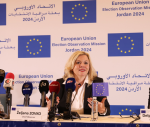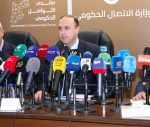You are here
Minister urges study into impact of ‘Arab Spring’ on women in region
By Rana Husseini - Nov 28,2016 - Last updated at Nov 28,2016
BEIRUT — Minister of Social Development Wajih Azaizeh on Monday called for a comprehensive study that would examine the deep impact of the so-called Arab Spring on women in the region.
“We thought that the Arab Spring will change things to the better in our region by modernising and developing the states and advancing women’s right,” Azaizeh told a Euro-Med Women’s Rights Conference, organised by the Euro-Med Feminist Initiative (EFI) and supported by the EU.
However, the minister added, “things went backwards; violence and extremism increased and it affected women the most because it forced many to return home and abandon their workplaces”.
That is why, “we need a comprehensive and deep study that would help understand what happened, why it happened and how we can fight it to restore women’s rights in the area”, he stressed.
The conference, titled “From Ministerial Conclusions to Gender Equality Policy Making in the Euro-Med Region”, is being held in Beirut to discuss and finalise the policy recommendations as well as create favourable conditions for monitoring the implementation of the Ministerial Conclusions in several areas related to discrimination against women, education and gender stereotyping.
Minister of Political and Parliamentary Affairs and Minister of State Musa Maaytah also spoke at the meeting and touched on the social barriers that hinders women’s progress.
Women’s fight should not be separated from society’s development, especially “with what is going on right now in our area”, Maaytah noted.
“It is our duty to convince society that its development depends on women’s empowerment and education as a whole. Changing laws alone, for example, will not help in the overall process,” he said.
Imen Kalai, the director of women’s affairs at the ministry of women, family and children in Tunisia, said the main challenge for Tunisian women is to eliminate all forms of violence against women.
“Several studies indicated an increase in violence against women since the Tunisian revolution, and, therefore, we had to do comprehensive and deep studies to determine why the numbers are increasing and worked hard to tackle it and find solutions that will minimise the effects of violence against women,” Kalai explained.
Stressing that women’s oppression is unacceptable, Lilian Halls French, co-president of the EFI, called for strong recommendations to support equality policies to be adopted at the ministerial meeting of next year.
French stressed the need to develop international cooperation to lobby against discriminatory laws and violations against women in general.
Deputy Secretary General for Social and Civil Affairs in the Secretariat of the Union for the Mediterranean (UfM) Ambassador Delphine Borione agreed with French, saying that there “is still a huge gap when it comes to implementing local and international laws”.
“We need to tackle all subjects related to women in a horizontal manner,” Borione said.
Meanwhile, Croatian lawmaker Vesna Pusic, who is also former first deputy of the prime minister, said that mainstreaming the rights of women and fighting for them is fighting for everyone’s rights.
“I believe that there is no male member in the society who does not benefit from gender equality… Male members of the society will have more rights and [a] safer environment when women’s rights are better protected,” added Pusic, who was also the former minister of foreign and European affairs.
Boriana Jönsson, the executive director of the EFI, said the main aim of the two-day meeting is to identify ways to translate the Paris Ministerial Conclusion into action and how to make next year’s meeting focus on concrete measures to push gender equality forward “to be adopted by governments in your respective countries”.
Government ministers at the 2013 Paris meeting committed to ensuring the equal rights of women and men to participate in political, economic, civil and social life, and combating all forms of violence and discrimination against women and girls, according to Jönsson.
The EFI approached the UfM Ministerial process on strengthening the role of women in society as a major tool to promote gender equality in the whole region since the first ministerial conference in Istanbul 2006, according to a statement by the organisers.
Following up on the ministerial conclusions and their implementation, EFI promotes and enhances dialogue between women’s rights organisations and political decision makers in the area of gender equality and women’s rights.
In 2015, as part of this dialogue, EFI launched a process: “From the UfM Ministerial Conclusions to gender equality policymaking in the Euro-Med region” supported by the EU.
The aim was to contextualise the implementation of the Paris Ministerial Conclusions and address the ongoing challenges in the region, enhance regional cross sector co-operation through policy dialogue as well as exchange of best practices with existing networks and stakeholders.
Related Articles
AMMAN — Women groups on Wednesday called for establishing a women’s parliamentarian committee to address the growing challenges women are fa
AMMAN — Minister of Social Development Hala Lattouf last week stressed the need to further strengthen women’s role in the Mediterranea
BEIRUT — The government said on Tuesday it will study the policy recommendations issued by participants in a two-day Euro-Med women’s rights














